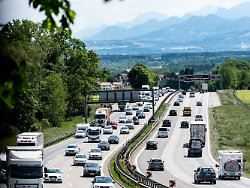Tuesday, June 8th 2021
Work away from home
3.4 million commute to another federal state
More and more people in Germany have to travel long distances to get to work. More than three million commute to another federal state. The left therefore condemns the position of the Greens in the petrol price debate as “cynical”.
For 3.4 million people in Germany, their place of work last year was in a different federal state than their place of residence. This emerges from the current commuter numbers of the Federal Employment Agency (BA), which are available to the German Press Agency and which the left has evaluated in the Bundestag. Accordingly, there has been a significant increase in the number of commuters in recent years: in 1999 only 2.1 million people did not work in the country in which they lived.
The BA figures do not show how many people temporarily did not have to commute at home because of corona-related work. A BA spokeswoman explained that the statistics were compared between the place of residence and place of work. “It cannot be shown whether the place of work is actually visited.”
However, the Federal Statistical Office had already carried out a survey in March of this year on the impact of the pandemic on commuter behavior. Accordingly, there was a decrease in commuting from March 2020. The decline intensified in April. In May 2020, more people were commuting again. There is currently a lot of discussion about whether after the pandemic people will be able to work more from home and therefore have to commute less.
Against the background of the current petrol price debate, left-wing social expert Sabine Zimmermann called for consideration for commuters. It would be “cynical if the price of even getting to work kept going up,” she said. Green leader Annalena Baerbock had – according to her party’s draft program – advocated a gasoline price increase of a total of 16 cents. She received a lot of criticism for the advance.
Berlin as the most frequent commute destination
According to the BA survey, the number of people living and working in different federal states fell slightly compared to 2019 in the past year: There were then 3.381 million state commuters subject to social insurance contributions. In 2019 it was 3.396 million.
According to the statistics, most commuters between the federal states in 2020 (225,000) were from Brandenburg to Berlin, and the lowest number (41) was from Bremen to Saarland. Using the example of the most populous federal state of North Rhine-Westphalia, it can be seen how pronounced there is also commuting beyond the metropolitan areas: 93,000 employees lived in North Rhine-Westphalia, but worked in neighboring Lower Saxony, 64,000 in neighboring Hesse, but also 47,000 in Bavaria and 38,000 in Baden-Württemberg.
The figures from the Federal Agency also show that around 408,000 East German employees commuted to the West in 2020 (2019: 415,000). Conversely, around 178,000 people from West Germany came to work in the East.
Zimmermann said: “The employees are required to be mobile and sometimes long distances to work. No federal government, not even the Greens, have so far wanted to change anything.” As far as traffic is concerned, Zimmermann pleaded for an end to the internal combustion engine. The federal government must keep the way to work affordable. This included the expansion of the railway with cheap tickets and affordable electromobility.
.
